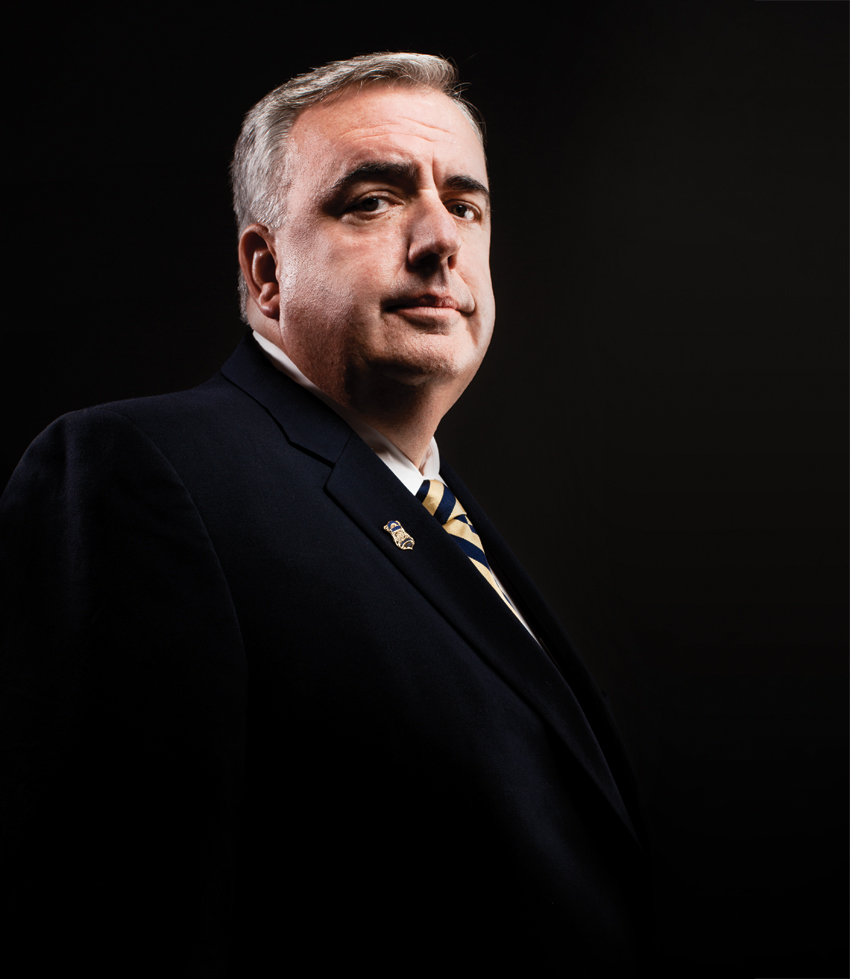America’s Most Wanted?

Photograph By Scott M. Lacey
Editor’s note: As we published this piece, Ed Davis announced his resignation as the Boston Police Commissioner. Read more of David S. Bernstein’s interview with Davis here.
A fascinating moment took place about 13 minutes into a press conference on the evening of April 19, just after the capture of the alleged Boston Marathon bomber Dzhokhar Tsarnaev. It was a key moment in the ongoing canonization of Ed Davis, Boston’s police commissioner since 2006. If you blinked you might’ve missed it, but if you looked closely enough, you could see the precise instant that Davis became the take-charge hero of the Boston Marathon bombing.
That moment was broadcast live, as all of Boston—and much of the country—tuned in for the first official information about Tsarnaev’s arrest following a massive manhunt that had shut down much of the area. Ten officials had spoken, Davis included, and then came the first question from the press, about the sequence of events during the now-infamous siege in which Tsarnaev had been pulled, alive but gravely wounded, from a Watertown boat.
Richard DesLauriers, the FBI special agent in charge, moved ever so briefly toward the podium to answer the question, which made sense given that the federal authorities had commanded the day’s operation. But then the imposing Boston police commissioner strode forward and proceeded to hold court for more than five minutes, and 13 consecutive questions, before yielding to U.S. Attorney Carmen Ortiz. In those five minutes, Ed Davis made sure no one could ever blame the bombings on his department, and he became a star in the process.
Does it seem petty, even offensive, to bring up Davis’s prime-time, mike-hogging performance? Would it be going too far to compare it to the moment when George W. Bush bellowed through a bullhorn atop the World Trade Center rubble, claiming the mantle of leader-in-crisis while the havoc wreaked on his watch still smoldered beneath his feet? Perhaps. But that small, decisive moment at the podium was just the beginning. In the weeks that followed, Davis was everywhere. He jumped at the opportunity for national television exposure, giving interviews to CBS’s Face the Nation and 60 Minutes, and to CNN, Fox News, and countless others. He was summoned to Capitol Hill, and gave an electrifying performance in front of the House Homeland Security Committee hearing convened to review the facts related to the bombings.
As the cameras rolled, Davis used his high-profile platform to do something he has been known to do when trouble knocks: place blame elsewhere. Responding to questions about how a man flagged by Russian authorities as a potential terrorist managed to set off bombs in broad daylight during one of the most heavily surveilled events in Boston history, Davis threw the FBI under the bus. Federal agencies were to blame, he told Congress, because they had failed to share what they knew about Tamerlan Tsarnaev, Dzhokhar’s brother and alleged conspirator in the bombings. DesLauriers would publicly refute Davis’s testimony—saying the BPD “specifically had representatives assigned to the [Joint Terrorism Task Force] squad that conducted the 2011 Assessment of deceased terrorism suspect Tamerlan Tsarnaev”—but in the headlines that followed, the police commissioner’s version was the one that stuck.
There was soon a rash of speculation in the Boston press, led by a fawning column from the Globe’s Adrian Walker, that Davis could run for mayor. But that was later forgotten amid a mysterious new rumor. First the Globe, and then CNN.com, ran anonymously sourced reports that Davis was on the short-list of candidates to become the next secretary of homeland security. The secretive nature of the deliberations over the job makes it impossible to know whether Davis is, in fact, being considered for it—only a handful of people know, and they’re not talking—but several well-connected DC sources I’ve spoken with found this rumor far-fetched, even laughable.


